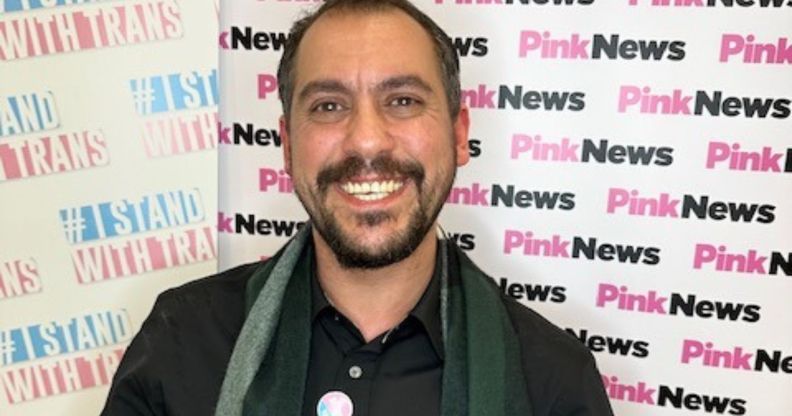Trans man received more than 280 job rejections in three years after disclosing gender identity

Leng Montgomery was “gobsmacked” to win the trans corporate champion award at the Trans in the City awards. (Sarah Moore)
Although corporate Britain has stepped up its public support of LGBTQ+ rights, it has a long road ahead to foster a truly inclusive space for trans staff, and one advocate is working to make that a reality.
The challenges of being trans extend to the workplace, where many adults spend a big part of their day. Some employers focus on building an inclusive environment for staff by offering LGBTQ+ employee groups or changing to a rainbow icon on social media during Pride Month.
Yet, Leng Montgomery tells PinkNews that, all too frequently, the trans experience may not even register on the radars of organisations when they work on corporate diversity, equity, and inclusion (DEI) efforts.
Montgomery reflects it’s been quite a journey for him from being outed by a toxic teacher as a teen and then struggling to find a job while transitioning to becoming the DEI leader he is now.
“If I go back even further to when I was 15, when I first came out, I had a very sharp message and warning to what it’s like when you’re an LGBT person and that is that the world is not always designed for us,” he says.
“I was at school when Section 28 was in place, and sadly, I had a quite homophobic teacher that found out.”
He describes how the “very inappropriate” teacher made him stand up once and asked if he missed two lessons “because [he] had AIDS like the rest of [his] friends”. The teacher then proceeded to out Montgomery.
Montgomery recalls how his mum gave him a piece of advice afterward which helped him get through a lot of situations being an openly LGBTQ+ person.
“She told me never to apologise or be ashamed of who I am, but she did say people are going to treat you differently; they’re going to try and mess with you, but it’s their problem,” he says. “I think, as a young person, at 15, I definitely needed to hear that.”

Montgomery says it was a “whole new kettle of fish of hostility” when he first started transitioning. This opposition impacted how he was able to enter the world of work as an openly trans person.
In a 2018 TEDx Talk, Montgomery shared he had 280 job rejections during three years. He discovered, through meticulous tracking, he wasn’t getting any interviews when he was open about being trans in his applications.
Montgomery remembers it being a “very painful” time before he was able to get his “foot on the rungs” in his 30s, but since then, has landed roles with high-profile organisations and been responsible for delivering and shaping DEI objectives, as well as activity for Sainsbury’s, ASOS and Burberry.
Now, Montgomery is well-respected for championing LGBTQ+ people in the workplace and was recognised for his hard work with the trans corporate champion award at the Trans in the City awards.
He says one of the first things he thinks about is who’s “not in the room” and looks at the “workplace of the future”.
“We are vastly moving into a multi-demographic, muti-age generation workforce in workplaces now,” he explains. “I know the world is going to look very different to how it is now [in the future], and I think that’s the whole point of representation.”
He continues: “It’s about being proactive, rather than reactive… You might not get anyone with a certain type of gender marker, but knowing it’s there [in workplace systems] makes it feel more inclusive.”
Montgomery feels still a bit “gobsmacked” he won the Trans in the City accolade. He says it was nice to know his work in DEI over the last decade “has had some impact”.
“I appreciated [it] because that one was based on workplaces and given my journey – my emotional one and some of the issues I had with getting a job in the first place – to be recognised professionally means something a lot more for me,” he says.
“It’s also something I’ve found quite humbling as well. It’s made me think I need to work twice as hard now.”
How did this story make you feel?

